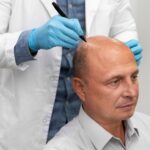Erectile Dysfunction (ED) is a prevalent condition affecting millions of men worldwide. It can significantly impact self-esteem, relationships, and overall well-being. Although ED Treatment is often linked to aging, younger men are also susceptible due to various factors such as stress, lifestyle choices, and underlying health conditions. Fortunately, ED is treatable, and understanding the treatment options available can help men regain their confidence and quality of life.
What is Erectile Dysfunction?
Erectile Dysfunction is defined as the inability to achieve or maintain an erection sufficient for satisfactory sexual performance. While occasional difficulties in achieving an erection are common and may not be a cause for concern, persistent ED can be a sign of underlying health issues. The condition can affect men at any age, though it becomes more common as men age.
ED can be caused by a variety of factors, both physical and psychological. Physical causes may include cardiovascular disease, diabetes, obesity, and hormonal imbalances. Psychological factors like stress, anxiety, depression, and relationship problems can also contribute to ED. In some cases, a combination of both physical and psychological factors may be at play.
Causes of Erectile Dysfunction
Erectile Dysfunction is often linked to specific health conditions, lifestyle choices, and other factors. Some of the most common causes include:
- Cardiovascular Health: Poor circulation due to heart disease, high cholesterol, or high blood pressure can limit blood flow to the penis, making it difficult to achieve an erection.
- Diabetes: High blood sugar levels can damage blood vessels and nerves, leading to ED.
- Obesity: Being overweight can contribute to low testosterone levels, poor circulation, and other health issues that affect erectile function.
- Hormonal Imbalances: Low levels of testosterone or other hormone imbalances can interfere with sexual function.
- Mental Health Issues: Anxiety, depression, and stress can lead to or exacerbate ED. Psychological causes are particularly common in younger men.
- Medications: Some medications, including antidepressants, blood pressure medications, and others, can have side effects that contribute to erectile problems.
ED Treatment Options
There are several treatment options available for men dealing with ED, ranging from lifestyle changes to medical interventions. The choice of treatment depends on the severity and underlying cause of the condition.
1. Lifestyle Modifications
One of the first steps in treating ED is addressing any lifestyle factors that may be contributing to the condition. Healthy changes to diet, exercise, and habits can improve overall health and may alleviate ED symptoms.
- Exercise: Regular physical activity can improve cardiovascular health, boost circulation, and increase testosterone levels, all of which are crucial for erectile function.
- Diet: A diet rich in fruits, vegetables, whole grains, lean proteins, and healthy fats can support good health and improve blood flow. Avoiding processed foods and excessive alcohol can also be beneficial.
- Weight Management: Maintaining a healthy weight is essential for managing conditions like diabetes and high blood pressure, both of which can contribute to ED.
- Quit Smoking and Limit Alcohol: Smoking and excessive alcohol consumption can negatively affect circulation and sexual health. Quitting smoking and moderating alcohol intake can help improve ED symptoms.
2. Medications
For many men, prescription medications are a common and effective treatment for ED. These medications work by increasing blood flow to the penis, helping men achieve and maintain an erection. Some popular oral medications include:
- Sildenafil (Viagra): Sildenafil is one of the most well-known treatments for ED. It works by inhibiting the enzyme phosphodiesterase type 5 (PDE5), which increases blood flow to the penis.
- Tadalafil (Cialis): Tadalafil works similarly to sildenafil but has a longer duration of action, lasting up to 36 hours. This allows for more spontaneous sexual activity.
- Vardenafil (Levitra): Vardenafil is another PDE5 inhibitor that helps improve blood flow to the penis and is taken about an hour before sexual activity.
- Avanafil (Stendra): Avanafil is a newer PDE5 inhibitor that works quickly and has fewer side effects compared to other medications.
While these medications are effective for many men, they are not suitable for everyone. Men with certain medical conditions, such as heart disease or low blood pressure, may not be able to use these medications safely.
3. Therapy and Counseling
For men whose ED is caused or exacerbated by psychological factors, therapy or counseling can be an effective treatment. Cognitive-behavioral therapy (CBT), sex therapy, or couples counseling can address issues like stress, anxiety, depression, and relationship problems that may be contributing to ED.
- Psychological Counseling: Therapy can help men cope with stress or anxiety, which may reduce performance pressure and improve erectile function.
- Sex Therapy: Working with a trained therapist can help individuals and couples address any sexual issues and improve communication, ultimately alleviating ED symptoms.
- Couples Counseling: In some cases, ED may strain relationships. Couples counseling can help partners work through any emotional or relational difficulties associated with the condition.
4. Medical Procedures and Devices
When medications or therapy do not work, other medical treatments may be recommended. These include:
- Penile Injections: For men who do not respond to oral medications, penile injections can be used to directly increase blood flow to the penis.
- Vacuum Erection Devices (VEDs): VEDs use suction to draw blood into the penis, helping to create an erection. These devices can be an effective option for men who prefer a non-invasive treatment.
- Penile Implants: In more severe cases of ED, penile implants may be considered. These devices are surgically placed into the penis and can be inflated or deflated as needed to produce an erection.
5. Hormone Therapy
If low testosterone levels are identified as the cause of ED, hormone replacement therapy (HRT) may be an option. This treatment involves supplementing the body’s natural testosterone levels through injections, patches, or gels.
Conclusion
Erectile Dysfunction is a common condition, but it is also treatable. Men suffering from ED should not hesitate to seek medical advice, as there are numerous treatment options available to address the root causes of the condition. Whether through lifestyle changes, medications, therapy, or medical interventions, ED can be managed effectively, helping men regain their confidence and sexual health. In the search for effective ED treatment options, healthcare professionals and clinics, such as HashClinics, can provide tailored solutions to meet individual needs. Taking the first step toward treatment can lead to a healthier, more fulfilling life.





